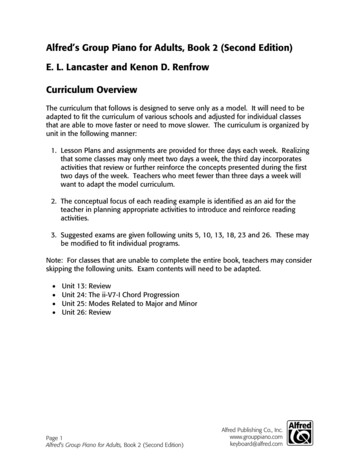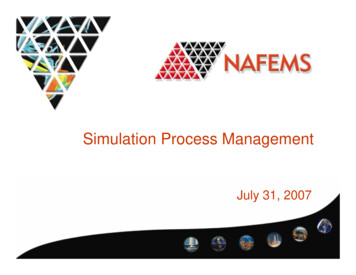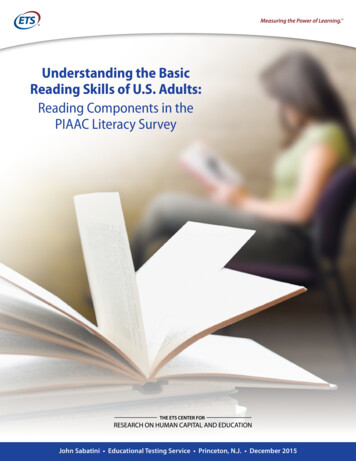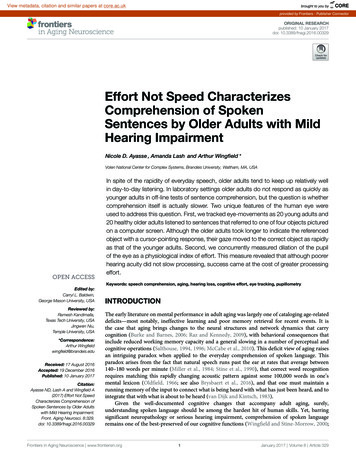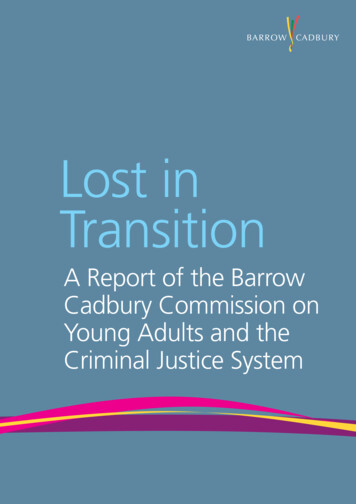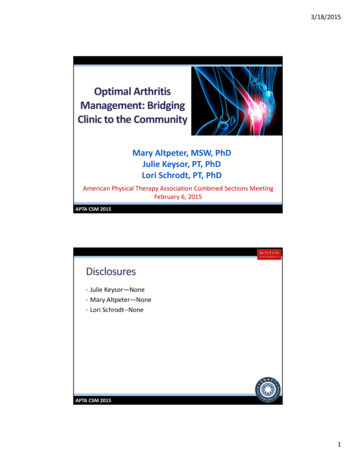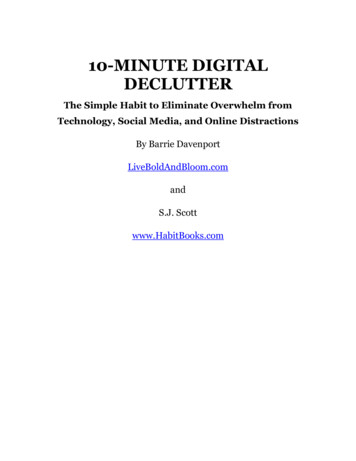
Transcription
Academic CatalogTennessee CampusesPreparing today’sworking adultsto compete andthrive in a changingglobal economy.Volume 46Effective July 1, 2012through June 30, 2013
2012-2013UNIVERSITY OF PHOENIXTENNESSEE CAMPUSESACADEMIC CATALOGVolume 46July 1, 2012 through June 30, 2013 catalogwith Addendum, Effective February 1, 2013“As we move to meet the educational needs of working adults in a mobile society, our conception of the university must extendbeyond place and embrace process. An adult university cannot be campus bound, rather its borders must be defined by the lives ofits students.”Dr. John G. SperlingFounder andChairman of theBoard
Information contained in this catalog is subject to change at the discretion of the University of Phoenix without prior notification.Unless specifically stated otherwise in a particular Catalog policy, in the event of any inconsistency or conflict between the information contained in this catalog and any other material, the information contained in the catalog shall take precedence.The University of Phoenix is not responsible for information or claims made by individuals not affiliated with the University that iscontrary to University of Phoenix published material.Annual Security Report NoticeThe University of Phoenix annual security report includes statistics for the previous three years concerning reported crimes thatoccurred on campus, in certain off-campus buildings or property owned or controlled by the University, and on public propertywithin, or immediately adjacent to and accessible from, the campus. The report also includes the sex offender registry, institutionalpolicies concerning alcohol and drug use, crime prevention, the reporting of crimes, sexual assault, and other related matters. Youcan obtain a copy of this report by contacting your local Campus Security Authority or by accessing the followingWeb site: http://www.phoenix.edu/safety.University of Phoenix is authorized by the Tennessee Higher Education Commission. This authorization must be renewed eachyear and is based on an evaluation by minimum standards concerning quality of education, ethical business practices, healthand safety, and fiscal responsibility.Chattanooga CampusThe Chattanooga Campus is centrally located 1208 Pointe Centre Drive Suite 100. There are 18 classrooms including 1 classroomthat is equipped with 14 computer workstations. There is also a Student Resource Center offering 28 computer workstations and 10learning team rooms for use by individuals or small groups. The entire campus is equipped with Wi-Fi access.Nashville CampusThe Nashville Main campus is located near Nashville's airport at 616 Marriott Drive, Nashville, TN. The campus includes 30 classrooms, 18 specialized meeting rooms with computers, a student lounge, and a student resource center with 23 computers and printing capability. The entire campus is equipped with wireless internet.Clarksville Learning CenterThe Clarksville Location, at 141 Chesapeake Lane in Clarksville, TN, has 4 classrooms, 4 meeting rooms with computers, and anSRC with 15 computers. The location has wireless internet throughout the building for students.Murfreesboro Learning CenterThe Murfreesboro Location is placed in the Avenue Shopping Center at 2615 Medical Center Parkway in Murfreesboro, TN. Thislocation has 5 classrooms, 8 meeting rooms with computers, and a 16 computer student resource center. All classrooms have wireless internet capability.Memphis CampusThe Memphis Campus is located in the Germantown Park, placed off of Germantown Parkway and Walnut Grove at 65Germantown Ct.The Memphis Campus has 26 classrooms equipped with Wi-Fi access; two of the 26 classrooms are equipped with at total 34 computer workstations. We also offer two Student Resource Centers with a total of 28 computer workstations. We offer 5 learning teamrooms for individual/small groups.The Memphis Campus also offers 4 workstations for faculty/staff and an additional 6 workstations for faculty in the FacultyResource Center.Knoxville CampusThe University of Phoenix Knoxville Campus located at 10133 Sherrill Blvd. is a more than 11,000 square-foot learning center, featuring 8 classrooms, 3 learning team rooms to accommodate the University's collaborative learning team model, and 13 computerworkstations with access to rEsource and eCampus, the University's electronic portal to all course content and support materials.
.ADDENDUM - UPDATED POLICY.The following policy is effective as of February 1st, 2013. Please seethe updated policy information below. The new information isbelow will supercede the existing policy located in the ConsumerInformation and University of Phoenix sections of this catalogProgram AccreditationUniversity of Phoenix School of Business/Business ProgramsUniversity of Phoenix is accredited by the Accreditation Councilfor Business Schools and Programs (ACBSP) to offer businessdegrees in Associate of Arts in Business Foundations, Associate ofArts in Accounting, Bachelor of Science in Business, Bachelor ofScience in Accounting, Master of Business Administration, Masterof Management, Master of Science in Accountancy, Doctor of Business Administration, and Doctor of Management.ACBSP11520 W. 119th St.Overland Park, KS 66213(913) 339-9356http://www.acbsp.orgAddendum
.ADDENDUM - NEW PROGRAM APPROVED.The following program(s) is(are) approved to be offered effectiveFebruary 1, 2013. Please see the program description(s), courserequirements, required courses, additional course descriptions andany other programmatic requirements listed below.Bachelor of Science in Information Technology.The following Bachelor of Science in Information Technology (BSIT)program may be offered at these University of Phoenix campus locations:Chattanooga. The availability of programs and concentrations depend onstudent demand and other factors. Not all programs may be available to allresidents of all states. Students may want to consider completing certaincourses in the Online classroom at Online rates if the program is availablevia the Online modality in their state. Please contact your enrollmentadvisor for more information.The Bachelor of Science in Information Technology (BSIT) programis focused on the acquisition of theory and application of technicalcompetencies associated with the information technology profession. The courses prepare students with fundamental knowledge incore technologies, such as systems analysis and design, programming, database design, network architecture and administration,Web technologies and application development, implementationand maintenance.Courses requiring prerequisites are identified by a symbol following the course number.A Track Required Introductory CourseGEN 200 . 3 creditsFoundations for General Education and Professional SuccessB Track Required Introductory CourseGEN 195. 3 creditsFoundations of University StudiesBSIT Required Course of Study - A Track and B TrackCIS 207 . 3 creditsInformation Systems FundamentalsPRG 211 . 3 creditsAlgorithms and Logic for Computer ProgrammingWEB 240 . 3 creditsWeb Design FundamentalsPOS 355 . 3 creditsIntroduction to Operating SystemsENG 221 . 3 creditsTechnical Writing FundamentalsBSA 310 . 3 creditsBusiness SystemsBSA 375 . 3 creditsFundamentals of Business Systems DevelopmentCMGT 410 . 3 creditsProject Planning & ImplementationDBM 380 . 3 creditsDatabase ConceptsCMGT 400 . 3 creditsIntro to Information Assurance & SecurityNTC 362 . 3 creditsFundamentals of NetworkingPRG 420 .3 creditsJava Programming IMTH 221 .3 creditsDiscrete Math for ITCMGT 445 .3 creditsApplication ImplementationConcentration in Advanced NetworkingFor more information about our graduation rates, the median debtof students who completed the program, and other importantinformation, please visit our website at http://www.phoenix.edu/programs/bsit-an.NTC 405 .3 creditsTelecommunications and Networking INTC 406 .3 creditsTelecommunications and Networking IINTC 409 .3 creditsGlobal Network Architecture and DesignNTC 411 .3 creditsGlobal Network Management, Support and SecurityNTC 415 .3 creditsNetwork Integration ProjectConcentration in Business Systems AnalysisFor more information about our graduation rates, the median debtof students who completed the program, and other importantinformation, please visit our website at http://www.phoenix.edu/programs/bsit-bsa.BSA 400 .3 creditsBusiness Systems Development IIBSA 411 .3 creditsSystems Analysis MethodologiesBSA 412 .3 creditsSystems Analysis ToolsCMGT 411 .3 creditsProject Planning ManagementCMGT 413 .3 creditsApplication Acquisition & SourcingConcentration in Information ManagementFor more information about our graduation rates, the median debtof students who completed the program, and other importantinformation, please visit our website at http://www.phoenix.edu/programs/bsit-im.IM 300 .3 creditsData Organization ArchitectureIM 305 .3 creditsData ModelingPOS 410 .3 creditsSQL for BusinessDBM 384 .3 creditsSpecial Purpose DatabasesDBM 460 .3 creditsEnterprise Database Management SystemsAddendum
University of Phoenix, 2013Concentration in Information Systems SecurityConcentration in Web DevelopmentFor more information about our graduation rates, the median debtof students who completed the program, and other importantinformation, please visit our website at http://www.phoenix.edu/programs/bsit-iss.POS 420 . 3 creditsIntroduction to UNIXPOS 421 . 3 creditsWindows Server NetworkingCMGT 441 . 3 creditsIntroduction to Information Systems Security ManagementCMGT 442 . 3 creditsInformation Systems Risk ManagementCMGT 430 . 3 creditsEnterprise SecurityConcentration in Multimedia &Visual CommunicationFor more information about our graduation rates, the median debtof students who completed the program, and other importantinformation, please visit our website at http://www.phoenix.edu/programs/bsit-wd.VCT 300 . 3 creditsImage EditingWEB 401 . 3 creditsWeb DevelopmentWEB 407 . 3 creditsAdvanced Web DevelopmentWEB 434 . 3 creditsWebsite Commercialization IWEB 435 . 3 creditsWebsite Commercialization IIThe University reserves the right to modify the required course ofstudy.Additional Admission Requirements for the BSITFor more information about our graduation rates, the median debtof students who completed the program, and other importantinformation, please visit our website at http://www.phoenix.edu/programs/bsit-mvc.VCT 300 . 3 creditsImage EditingVCT 320 . 3 creditsElectronic PublishingVCT 410 . 3 creditsInstructional DesignVCT 420 . 3 creditsMultimedia DevelopmentWEB 431 . 3 creditsXMLConcentration in Software EngineeringFor more information about our graduation rates, the median debtof students who completed the program, and other importantinformation, please visit our website at http://www.phoenix.edu/programs/bsit-se.PRG 421 . 3 creditsJava Programming IIBSA 385 . 3 creditsIntro to Software EngineeringCSS 422 . 3 creditsSoftware ArchitecturePOS 408 . 3 credits.NET IPOS 409 . 3 credits.NET IIAddendumAll applicants are expected to meet the following admissionsrequirements: High school graduation from an institution that holds stateapproval to confer high school diplomas or are accredited or acandidate for accreditation at the time the student attended byan acceptable accrediting body, GED certificate or CHSPE(California High School Proficiency Examination) certificate. Tennessee: Students residing in Tennessee who are attendingclasses via the Online modality and students attending alocal campus in Tennessee, including from any cross-borderlocations, must provide the university with an official HighSchool transcript or official GED score (if applicable). Acollege transcript which documents high school date ofcompletion or a copy of a DD-214 showing high schoolgraduation or equivalency may be submitted to satisfy thisrequirement. Applicants must be currently employed or have access to a workenvironment.Degree Requirements for the BSIT Completion of a minimum of 120 credits that include thefollowing distribution: A minimum of 42 upper division credits. A minimum of 54 credits of the 120 credits must be in thegeneral education areas approved by the University. A minimum grade point average (GPA) of 2.0. All students must complete the minimum number of creditsrequired by their degree program. All undergraduate students are required to complete theminimum general education credits required by their programversion. Students will declare a concentration at the time of enrollment. The diploma awarded for this program will read as:Bachelor of Science in Information Technology and will notreflect the concentration. Concentrations are reflected on thetranscript only.
University of Phoenix, 2013ADDENDUM - NEW PROGRAM APPROVEDGeneral Education Requirements for the BSITA minimum of 54 of the 120 credits must be in the general education areas approved by the University.Communication Arts Requirement 6 credits(A Track must include COMM 215, equivalent, or higher and COMM218)(B Track must include: COM 170 and COM 172)Mathematics Requirement 6 credits(Must include MTH 220, equivalent, or higher)Science & Technology Requirement 6 credits(B Track must include: SCI 163)Must include at least three (3) credits in the physical or biological sciencesHumanities Requirement 6 credits(B Track must include: HUM 114)Social Science Requirement 6 credits(B Track must include: PSY 211)Additional Liberal Arts Requirement 6 credits(B Track must include COMM 218)Interdisciplinary Requirement 18 credits(B Track must include: FP 120)Academic Progression Requirements for the BSIT All students entering undergraduate degree programs who listless than 24 previous college credits as recognized by theuniversity on the admissions application will be enrolled in theB Track and are required to complete the First-Year Sequence. First-Year Sequence students must satisfy all seven (7) coursesfrom the First-Year Sequence prior to enrolling in any otherGeneral Education, elective, or concentration courses. GEN 195 will be required as the first course in the First-YearSequence. HUM 114 will be required as the last course in the First-YearSequence. All other FYS requirements must be satisfied prior toenrolling in any other program applicable course. With the exception of GEN 195, FP 120, and HUM 114, courserequirements may be satisfied by any of the following means: University of Phoenix coursework, Regionally or nationally accredited coursework (C- or highergrade), University of Phoenix Prior Learning Assessment, (30 creditlimit on experiential learning; 30 credit limit on professionaltraining), National Testing Programs, and ACE evaluated Military credits. The course used to satisfy a First-Year Sequence course mustbe comparable in content to the university course It isreplacing, must be at least a 2.67 credit course, and must bean equivalent level or higher level course. Concurrent enrollment is prohibited during any of the courses inthe First-Year Sequence. Students who list 24 or more previous college credits, asrecognized by the university on the admissions application,must take GEN 200 Foundations for General Education andProfessional Success as the first course with University ofPhoenix and are not required to enroll in the First-Year Sequence(A Track). Students who list 24 or more previous college credits, asrecognized by the University on the admissions application, andwho do not enroll in the First-Year Sequence, may not enroll inany course from the First Year Sequence to satisfy programmaticprerequisites, general education or elective requirements. Students who previously completed GEN 101, GEN 200, or GEN300 and choose to transition to the First-Year Sequence are notrequired to take GEN 195. Students may not complete any of the First-Year Sequencecourses via Directed Study. Many courses in the Required Course of Study build on orreinforce each other. To ensure that students have the requisiteskills for specific coursework certain program areas must besatisfied before students can progress to others. All undergraduate students must satisfy math and Englishprerequisites prior to enrolling in any course that requires mathor English as a prerequisite.Residency Requirements and Course Waivers for the BSITStudents must meet the established University residency requirement for degree conferral. The University requires that the majorityof coursework, 30 credits from a combination of the RequiredCourse of Study, General Education, and Electives must be completed at University of Phoenix.Students in this program may waive a maximum of 30 credits fromtheir required course of study on the basis of regionally orapproved nationally accredited transferable coursework.In order to be granted a waiver for a course in the required courseof study, the student must have completed a previous course whichmeets the following criteria: The course must have been completed at a regionally orapproved nationally accredited, or candidate for accreditation,college or university. The course must have been completed within the past five (5)years (ten years for MTH 221) of application to the Universitywith a grade of "C" (2.0) or better. The course must be comparable in content and credits to theUniversity course it is replacing and must be an equivalent levelor higher level course (i.e. graduate level coursework may beused to waive graduate or undergraduate coursework). Coursedescriptions must be included with the course waiver form inorder for the Office of Admissions and Evaluation to review thecourse waiver request.Addendum
University of Phoenix, 2013Through an approved articulation agreement, students who havesuccessfully completed equivalent courses may waive, withoutcredits, up to thirty (30) credits of the required course of study. Students must substitute other upper division coursework to satisfythe upper division credit requirement of their degree program.This policy also applies to upper division courses which are usedto fulfill Associate of Arts degree requirements. In order to begranted a waiver, without credit, for a course in the requiredcourse of study, a student must have completed a previous coursewhich meets the following criteria: The course must have been completed and transcripted from aregionally or nationally accredited institution with which theUniversity of Phoenix has an approved articulation agreement. The course must have been completed with a grade of "C" (2.0)or better during the effective dates of the approved articulationagreement. The course must be approved through the articulationagreement and must be comparable in content and credits to theUniversity course it is replacing.The following courses in the Required Course of Study may not bewaived: GEN 195, GEN 200Students may waive, with or without credit, courses in theRequired Course of Study, but must substitute with any upperdivision coursework to satisfy the required course of study(national testing program credit, prior learning credit, and militarycredit, or General Education coursework, may not be used toreplace coursework waived, with or without credit).Course Descriptions for the BSITGEN 200 . 3 creditsFoundations for General Education and Professional SuccessThis general education course is designed to introduce the intentional learner to communication, collaboration, information utilization, critical thinking, problem solving and professionalcompetence and values. The course uses an interdisciplinaryapproach for the learner to develop personal, academic strategiesin order to reach desired goals and achieve academic success.GEN 195 . 3 creditsFoundations of University StudiesThe essential information, skills, tools, and techniques necessaryfor academic success and personal effectiveness at the Universityof Phoenix are introduced in this course. The course develops andapplies practical knowledge and skills immediately relevant tofirst-year university students. Course topics include goal settingand working with personal motivation, understanding and usingUniversity resources, developing efficient study habits, making themost of personal learning styles, and how best to manage time andreduce personal stress levels.CIS 207 . 3 creditsInformation Systems FundamentalsThis course introduces the fundamentals of computer systems andthe role of information processing in today's business environment. An overview is presented of information systems, systemsdevelopment, operating systems and programming, databasemanagement, networking and telecommunications, and the Internet.AddendumPRG 211 . 3 creditsAlgorithms and Logic for Computer ProgrammingThis course provides students with a basic understanding of programming development practices. Concepts covered include theapplication of algorithms and logic to the design and developmentof procedural and object oriented computer programs to addressthe problem solving requirements associated with business information systems. This course will cover procedural programmingconcepts including data types, controls structures, functionaldecomposition, arrays, and files, classes and objects.WEB 240 . 3 creditsWeb Design FundamentalsThis course introduces development tools and techniques used topublish web pages on the World Wide Web. Students use basichypertext markup language, scripting, and presentational technologies to create websites with the aid of a software authoring application. Topics include XHTML, CSS, JavaScript , server hosting,site publication, site maintenance, and search engine optimization.POS 355 . 3 creditsIntroduction to Operating SystemsThis course provides an introduction to operating systems. Topicscovered include operating system concepts, program execution,and operating system internals such as memory, processor, device,and file management. A variety of operating systems are comparedand contrasted.ENG 221 . 3 creditsTechnical Writing FundamentalsThis course covers the fundamentals and best practices of usingwritten communication in business and in the information technologies. Topics include strategies, techniques, and nuances for producing emails, memos, reports, proposals, project specifications,and user manuals, as well as other technical documents.BSA 310 . 3 creditsBusiness SystemsThis course reviews common business systems and their interrelationships. Business systems covered include finance, accounting,sales, marketing, human resources, legal, and operations. Emphasis is placed upon the inputs and outputs of information systems,the potential for integration of the systems, and information systems security.BSA 375 . 3 creditsFundamentals of Business Systems DevelopmentThis course introduces the fundamental, logical, and design considerations addressed during system and application softwaredevelopment. It provides a solid background in information systems analysis and design techniques through a combination of theory and application. The Systems Development Life Cycle will befundamental to the course.CMGT 410. 3 creditsProject Planning and ImplementationThis course provides the foundation for successful project planning, organization, and implementation within the realm of information technology. The course uses real-world examples andidentifies common mistakes and pitfalls in project management.Topics covered include project scoping, estimating, budgeting,scheduling and staffing, tracking and controlling, and softwaretools for project management.
University of Phoenix, 2013ADDENDUM - NEW PROGRAM APPROVEDDBM 380 . 3 creditsDatabase ConceptsThis course covers database concepts. Topics include data analysis,the principal data models with emphasis on the relational model,entity-relationship diagrams, database design, normalization, anddatabase administration.CMGT 400. 3creditsIntro to Information Assurance & SecurityThis course is an introduction to information assurance and security in computing technolo
The Nashville Main campus is located near Nashville's airport at 616 Marriott Drive, Nashville, TN. The campus includes 30 class-rooms, 18 specialized meeting rooms with comp uters, a student lounge, and a student resource center with 23 computers and print - ing capability. The entire campus is equipped with wireless internet.
